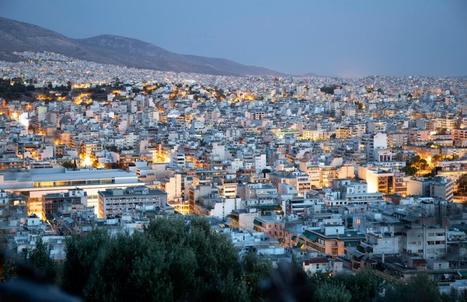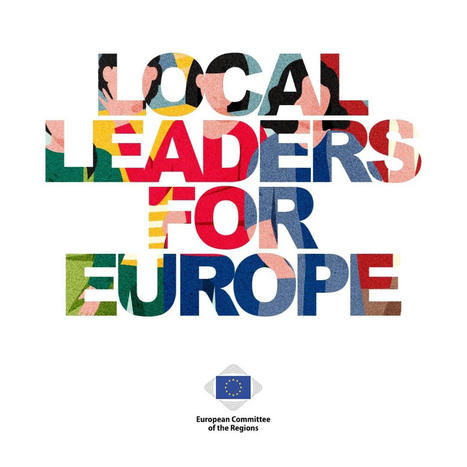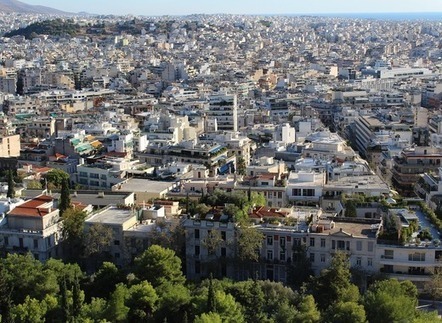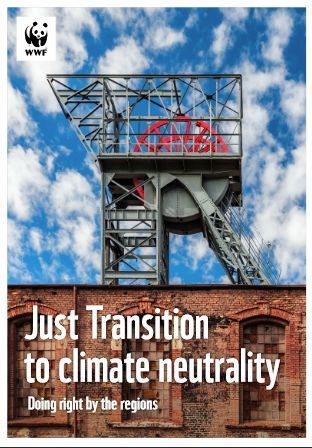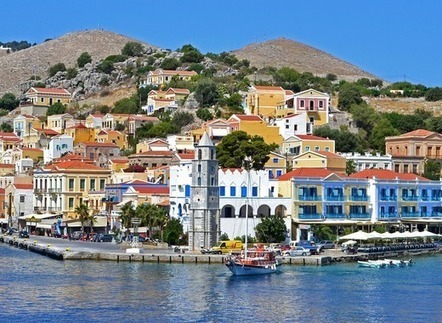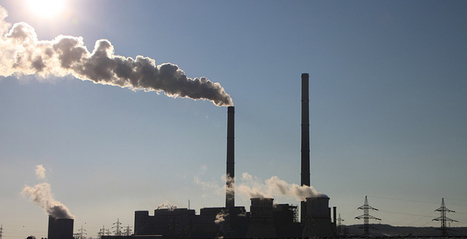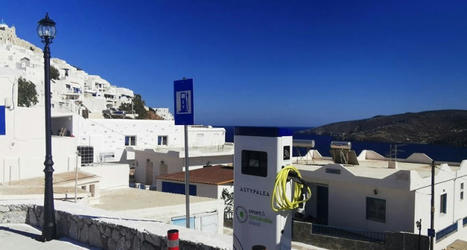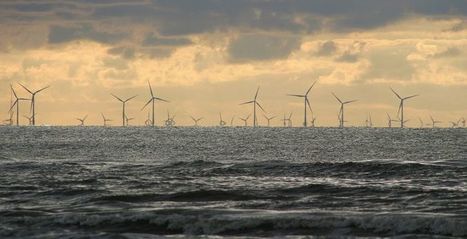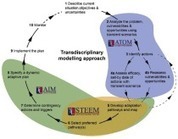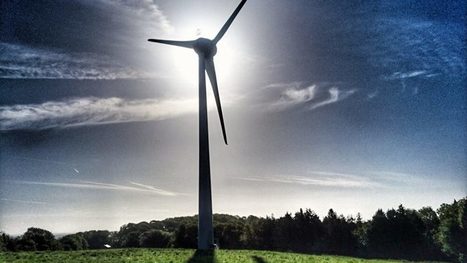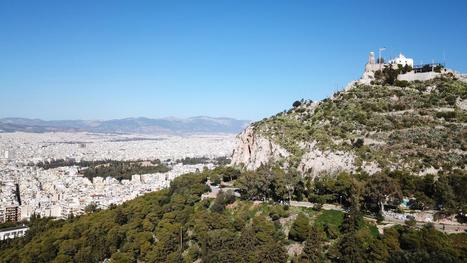 Your new post is loading...

|
Scooped by
Energy Cities
August 1, 2023 7:58 AM
|
Tilos, in the Aegean Sea, is the first island on the planet to be certified as zero-waste. This was achieved in only two years, which could serve as a blueprint for small communities worldwide.

|
Scooped by
Energy Cities
November 4, 2021 12:40 PM
|
On 1 November, the Greek capital revealed that it will soon implement the largest energy upgrade programme the country has ever planned. That is, the City of Athens will replace its current “traditional” lighting fixtures with a total of 43,679 new and modern lamps that will enhance the security of citizens, reduce costs, and benefit the environment.

|
Scooped by
Energy Cities
August 16, 2021 8:55 AM
|
The Local Leaders for Europe podcast is a series of interviews conducted at the European Committee of the Regions, the EU's assembly of regional and local authorities. In this episode 7, young elected politicians Emilia Wasielewska, city councillor in Konin, Poland, and Manolis Mavrommatis, deputy mayor in the municipality of Dorida, Greece, show how their generation strive to deliver the European Green Deal locally by leading youth groups that are committed to make their own territories greener, cleaner and more welcoming. They discuss how their cities are tackling climate change at the local level. See acast.com/privacy for privacy and opt-out information.

|
Scooped by
Energy Cities
March 11, 2021 5:00 AM
|
The Municipality of Athens has been honored at the CDP Europe Awards 2021 for its set of actions aimed at achieving “green recovery” in the post-Covid-19 era. CDP is a not-for-profit charity that runs a global disclosure system for investors, companies, cities, states and regions to manage their environmental impacts. In 2020, for a second …

|
Scooped by
Energy Cities
February 24, 2021 2:53 PM
|
The Regional Council of Western Macedonia may propose to suspend all licensing of renewable energy projects and their implementation until spatial and sustainable development planning rules are adopted for the area. It is the most important province for the energy transition plans pushed by Greece’s government.
Following controversy regarding a floating solar power plant project on one of Greece’s biggest lakes, the majority in the Regional Council of Western Macedonia decided to demand the suspension of all licensing for green energy applications and works until the completion of the regional framework for spatial planning and sustainable development as well as for renewables.
Regional and municipal councils must get a decisive role in the sector so that they can contribute to the creation of green jobs and environmental protection while ensuring the priority for local investors in the segment of renewable energy, the draft document adds. The proposal was launched immediately after the local authorities stood up against covering up to a quarter of one of the country’s biggest lakes with solar power plants.

|
Scooped by
Energy Cities
November 12, 2020 10:32 AM
|
Red tape, infrastructure woes and recent economic turmoil are holding Greece back from fully reaping the benefits of a much-needed energy transition

|
Scooped by
Energy Cities
June 8, 2020 5:29 AM
|
Such a move would allow not only for social distancing to be respected but could also lead to a complete makeover of the Athens city centre. By turning towards pedestrianization, the city will not only become healthier and more active but would also significantly reduce its environmental footprint.

|
Scooped by
Energy Cities
May 13, 2020 6:45 AM
|
Just Transition to Climate Neutrality – Doing Right by the Regions
A report by WWF Germany, February 2020 Just transition is a buzzword in policy circles today. There is consensus that the transition towards climate neutrality should be a just one. However, when and even if such a transition should really take place, is still met with vastly diverging viewpoints. At the same time, what ‘just’ actually means and what its implications are for national and EU policy is even less certain. This report – a review of four case study regions of the transition from coal in Europe – illustrates that even though each region is different, the challenges they face to ensure a just transition from coal are strikingly similar. Download

|
Scooped by
Energy Cities
February 25, 2020 3:55 AM
|
The European Investment Bank (EIB) and the Hellenic Distribution Network Operator, part of the Public Power Corporation (PPC) have signed an agreement for a 20-year loan amounting to 255 million euros.
The funding will be used to develop the capacities of the Greek electricity distribution network by modernizing and reinforcing the infrastructure supplying power both to the country’s islands and the mainland.

|
Scooped by
Energy Cities
December 18, 2019 4:40 AM
|
EUKI’s YESclima project held a workshop in mid-September on “Energy efficiency in buildings and natural techniques to cool/heat buildings”. One topic at this workshop was a presentation of the results ofenergy audits, conducted by students trained in the project.
The Greek organisation Wind of Renewal hosted this event. They invited the project partners – the University of Cadiz, the Energy Agency of Cadiz, the Free University of Berlin and the Secretariat for Future Studies – to the Welcommon Hostel in Athens. Representatives of other organisations such as the Center for Renewable Energy Sources & Saving (CRES), the Hellenic Passive House Institute and the Mayor of Agios Dimitrios also took part in the event.

|
Scooped by
Energy Cities
September 18, 2019 4:52 AM
|
Five EU countries including the UK, Germany, Greece, Poland, and Slovenia are looking to introduce new fossil fuel subsidies by 2030, an analysis of the 28 Member States’ draft energy and climate plans (NECPs) has revealed.
In a new report, “Fossil fuel subsidies in draft EU National Energy and Climate Plans: Shortcomings and final call for action,” experts from the Overseas Development Institute (ODI), Friends of the Earth (FoE) Netherlands, and Climate Action Network (CAN) Europe have analyzed the EU Member States’ draft NECPs, which require governments to report on their fossil fuel subsidies and plans to phase them out, the CAN has said in a press release.

|
Scooped by
Energy Cities
July 30, 2019 9:54 AM
|
In Greece, the renewable energy potential and a low-quality building stock constitute the background of a possible low-carbon energy transition. This transition, however, faces significant uncertainties, ranging from long-term effects of the ongoing economic recession and technological lock-ins, to the stability of the regulatory framework and issues of public acceptance. Such uncertainties may eventually give rise to significant barriers to, as well as severe economic and social consequences of, the envisaged transition. Here, in a structured approach to eliciting the knowledge embedded in stakeholders, we identify such risks and explore their dynamics and role in a sustainable transition to a power system that is based on large-scale solar projects and prosuming in the residential sector. We then employ a modelling ensemble, consisting of a macroeconomic dynamic stochastic general equilibrium model and a business strategy assessment model, in order to quantify and evaluate the extent of the identified risks’ impact.

|
Scooped by
Energy Cities
February 7, 2019 11:21 AM
|
While other EU countries, such as Germany, announce plans for coal phase-out within the next 20 years in compliance with their Paris Agreement commitments, Greece’s future appears locked in carbon for decades to come, write Demetres Karavellas and Nikos Charalambides.
|

|
Scooped by
Energy Cities
October 20, 2022 4:16 AM
|
Greece has been able to meet the entire county’s energy demand with renewable sources on 7 October 2022. Renewables now make up the biggest share in the country’s energy mix, overtaking natural gas, a..

|
Scooped by
Energy Cities
September 27, 2021 5:47 AM
|
synAthina connects the services of the municipality of Athens with formal and informal civil society groups. It began during a moment of crisis and is still going strong. We spoke with the project’s initiator and former Vice Mayor of Athens, Amalia Zepou.

|
Scooped by
Energy Cities
June 3, 2021 8:59 AM
|
Baptisée “le papillon de la mer Égée” en raison de sa forme, cette île de 1 300 habitants est visitée chaque année par quelque 70 000 touristes pour ses plages immaculées, sa mer cristalline et ses maisons blanches.
A l’horizon 2026, le projet ambitionne de faire d’Astypaléa “la première île durable de Méditerranée”, où “la mobilité sera électrique, alimentée par une électricité verte produite localement”, promet le gouvernement grec, qui a déployé mercredi plusieurs ministres dont le Premier ministre Kyriakos Mitsotakis sur l’île de l’archipel du Dodécanèse.

|
Scooped by
Energy Cities
March 4, 2021 4:43 AM
|
We asked our followers where they wanted to see be pedestrianised. Is your hometown on the list?

|
Scooped by
Energy Cities
February 10, 2021 9:03 AM
|
The Beacon is a quarterly newsletter with stories, news and developments on financial instruments in the context of Cohesion Policy. The winter edition, published last week, features among other things a significant study on residential energy efficiency financial instruments in Lithuania, two new videos on the combination of grants and financial instruments, as well as a new podcast episode on how ESIF Financial instruments support the development of the Venture Capital/Private Equity ecosystem in Greece.

|
Scooped by
Energy Cities
October 21, 2020 2:49 AM
|
Greece intends to increase the share of renewable energy in electricity consumption from 29.2% to 61% and the share in transport from 6.6% to 19%, according to its final National Energy and Climate Plan (NECP) for the period 2021-2030. The overall target for renewables is set at 35%, compared to 18% in 2018.

|
Scooped by
Energy Cities
May 18, 2020 6:15 AM
|
After years of stagnation, the new government wants to speed up the energy transition in Greece. Can the vast potential of wind and solar energy finally be exploited following the slow-down of recent…

|
Scooped by
Energy Cities
April 7, 2020 7:53 AM
|
This article presents a transdisciplinary modeling framework, which builds on the original Dynamic Adaptive Policy Pathways methodology. To demonstrate the applicability of this framework the authors used it to explore the evolution of the small-scale solar photovoltaics share in Greece, towards the achievement of the national capacity targets of 2025 and 2030. Model outcomes facilitated the identification of several pathways achieving the capacity targets, while reducing the risk for retroactive policy changes. Overall, the presented study demonstrates potential to support the design of adaptive policies over contextual evolutions so that social, economic and technological aspects of integrative planning are balanced towards the achievement of climate targets.

|
Scooped by
Energy Cities
December 24, 2019 12:01 PM
|
Speaking at recent EURACTIV event, Marc Lemaître, director-general for regional and urban policy at the European Commission, said new the Just Transition Mechanism would focus “on the communities and people who will face the biggest challenge in terms of job losses because of the necessary energy transition.”
The EU official cited western Macedonia as “an extreme case” to illustrate his point. The Northern Greek region directly depends on coal – mining and power plants – for one-third of its GDP, he pointed out. And the Greek government has decided to close down all the plants “before 2030” as part of its climate commitments, he said.
“We will make western Macedonia a role model region in the transition from lignite to clean energy and a different economic activity,” Mitsotakis emphasised.

|
Scooped by
Energy Cities
October 3, 2019 9:07 AM
|
France, Greece and Bulgaria have pledged to update their national targets for renewable energy and bump up the share of wind, solar and other renewables to 33%, 35% and 27% of their energy consumption respectively by 2030.

|
Scooped by
Energy Cities
September 16, 2019 8:25 AM
|
Athens is entering into four innovative climate adaptation projects with €5 million financing from the Natural Capital Finance Facility, a programme run by the European Investment Bank in cooperation with the European Commission that focuses on nature conservation, biodiversity and adaptation to climate change through nature-based-solutions.

|
Scooped by
Energy Cities
April 3, 2019 3:44 AM
|
Islands are ideal niches for the development of renewable energy. Remoteness, a common lack of fossil fuel sources, vulnerability to climate change, and risk of environmental disasters are some of the features that make it urgent for islands to transform into low-carbon, sustainable territories. As a response to this challenge, in 2015, two small islands in Europe, 5000 kilometers apart, committed to promote renewables to ensure energy security and independence.
|
 Your new post is loading...
Your new post is loading...





